
Begonia is a genus of perennial flowering plants in the family Begoniaceae. The genus contains more than 2,000 different plant species. The Begonias are native to moist subtropical and tropical climates. Some species are commonly grown indoors as ornamental houseplants in cooler climates. In cooler climates some species are cultivated outside in summertime for their bright colorful flowers, which have sepals but no petals.

Begoniaceae is a family of flowering plants with two genera and about 2040 species occurring in the subtropics and tropics of both the New World and Old World. All but one of the species are in the genus Begonia. There have been many recent discoveries of species in the genus Begonia, such as Begonia truncatifolia which is endemic to San Vincente, Palawan. B. truncatifolia is smaller in size than other species of the genus Begonia and this new species is proposed Critically Endangered by standards set by the IUCN. The only other genus in the family, Hillebrandia, is endemic to the Hawaiian Islands and has a single species. Phylogenetic work supports Hillebrandia as the sister taxon to the rest of the family. The genus Symbegonia was reduced to a section of Begonia in 2003, as molecular phylogenies had shown it to be derived from within that genus. Members of the genus Begonia are well-known and popular houseplants.
Begonia cavaleriei is a species of plant in the family Begoniaceae. It is endemic to China. It grows on limestone rocks.
Begonia hainanensis is a species of plant in the family Begoniaceae. It is endemic to China. It grows in forests and on mossy rocks.
Begonia peltatifolia is a species of plant in the family Begoniaceae. It is endemic to China. It grows on limestone rocks and broad-leaved forests.
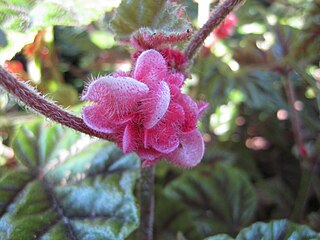
Begonia incarnata is a species of plant in the family Begoniaceae, native to Brazil. It is a shrublike evergreen perennial growing to 1 metre (39 in), bearing large, asymmetrical green leaves with a metallic sheen, and dark green veins. It produces small hairy pink flowers. As it does not tolerate temperatures below 10 °C (50 °F), in temperate regions it must be grown under glass.

Begonia palmata is a species of plant in the genus Begonia of the family Begoniaceae. It is a small herb of height 20–90 cm tall. It is found in moist places, next to streams or under the shade. It is found in many parts of Asia, including eastern Himalayas.

Begonia cucullata, also known as clubbed begonia, is a species of the Begoniaceae that is native to South American countries of Argentina, Brazil, Paraguay, and Uruguay. A common garden plant and part of the section Begonia, it was described in 1805 by Carl Ludwig Willdenow (1765–1812). The specific epithet "cucullata" means "resembling a hood" or "hooded".

Begonia dregei, the maple leaf begonia or grape-leaf begonia, is a species of flowering plant in the genus Begonia native to the Eastern Cape and KwaZulu-Natal provinces of South Africa. It has gained the Royal Horticultural Society's Award of Garden Merit.

Begonia radicans, the shrimp begonia, is a species of flowering plant in the genus Begonia, native to southeastern and southern Brazil. It has gained the Royal Horticultural Society's Award of Garden Merit.

Begonia rex, the king begonia, is a species of flowering plant in the family Begoniaceae. It is found from Arunachal Pradesh to southeast China, and has been introduced to Bangladesh, Cuba, and Hispaniola. It is a parent to over 500 cultivars in the Begonia Rex Cultorum Group of houseplants. Other parents in the multitude of crosses made during the creation of the Group include Begonia annulata, B. cathayana, B. decora, B. diadema, B. dregei, B. grandis, B. hatacoa, B. palmata, and B. xanthina.

Begonia heracleifolia, the star begonia, is a species of flowering plant in the family Begoniaceae. It is native to Mexico and northern Central America, and has been introduced to Cuba, Hispaniola, Puerto Rico, and Trinidad and Tobago. A widespread species that is adapted to drought, it possesses considerable genetic and morphological variation, particularly in leaf shape and patterning.
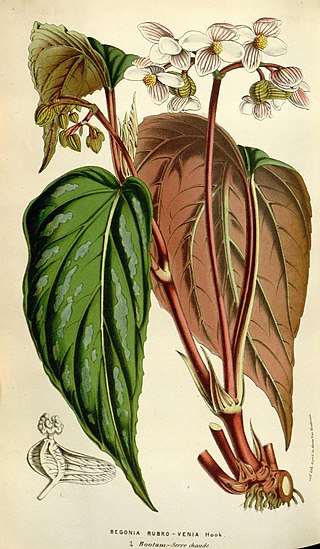
Begonia hatacoa is a species of flowering plant in the family Begoniaceae, native to Tibet, Nepal, the eastern Himalayas, Assam, Bangladesh, Myanmar, Thailand, and Vietnam. Its best-known cultivar is 'Silver'.
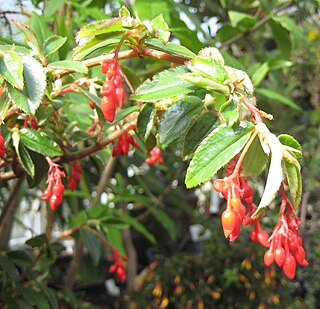
Begonia fuchsioides, the fuchsia begonia, is a species of flowering plant in the family Begoniaceae. It is native to Ecuador, Colombia, and western Venezuela, and has been introduced to Hawaii and Réunion. A small bush reaching 2 ft (60 cm), it is hardy to USDA zone 10a.
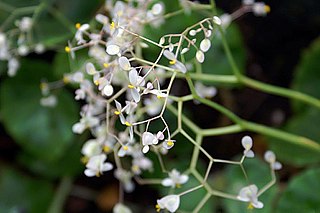
Begonia manicata is a species of flowering plant in the family Begoniaceae, native to Mexico and Central America. The cultivar 'Aureo-maculata' is called the leopard begonia.
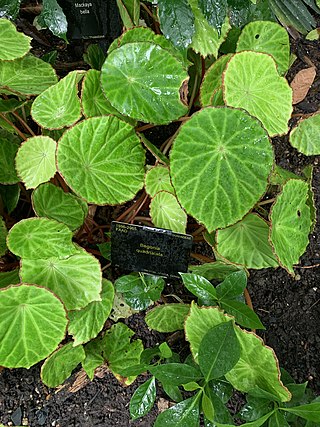
Begonia quadrialata is a species of flowering plant in the family Begoniaceae, with a native range from central Tropical Africa down to Angola. A molecular phylogenetic analysis published in 2004 indicates that B. quadrialata is most closely related to B. potamophila.
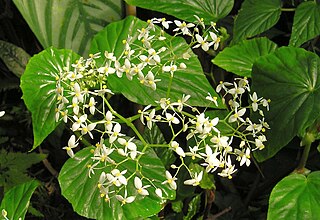
Begonia capensis is a species of Begonia found in Brazil.

Begonia luzhaiensis is a species of Begonia found in Guangxi, China.
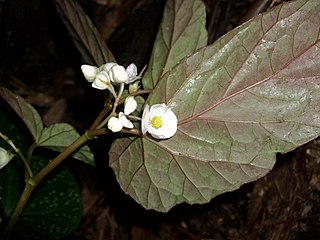
Begonia taiwaniana is a species of Begonia found in Taiwan.
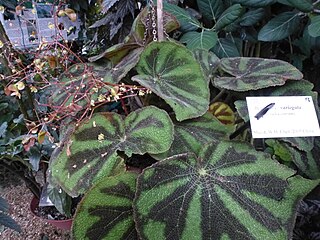
Begonia variegata is a species of Begonia found in Vietnam.

















